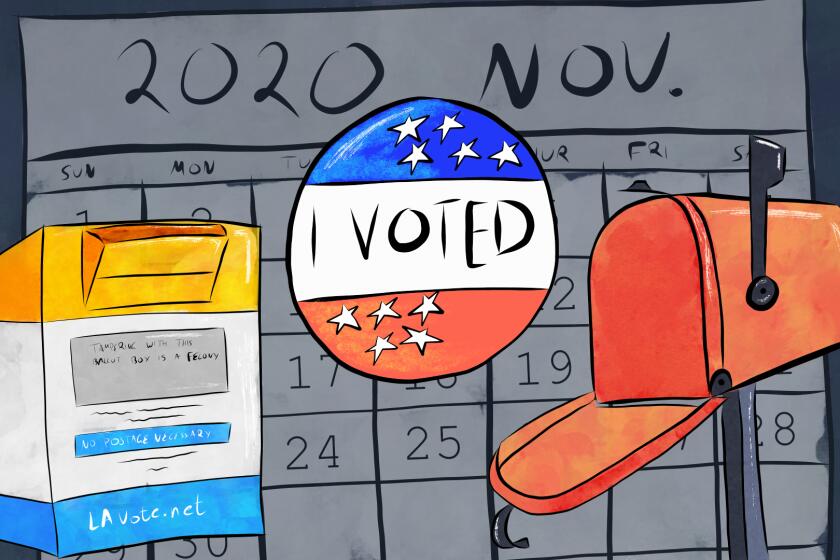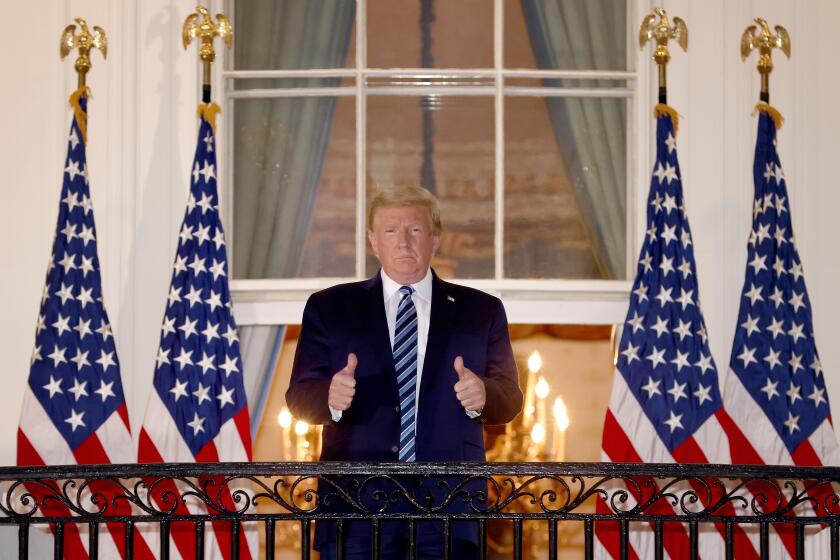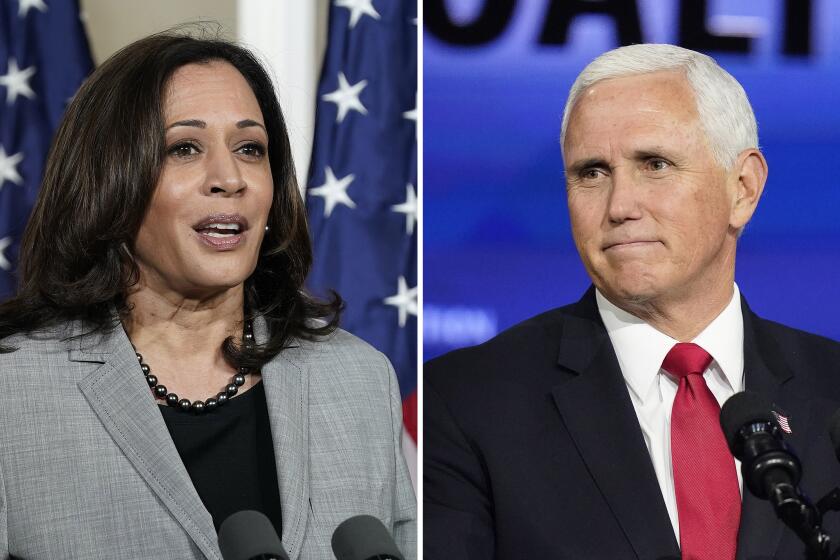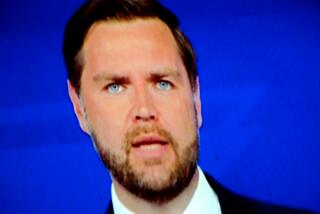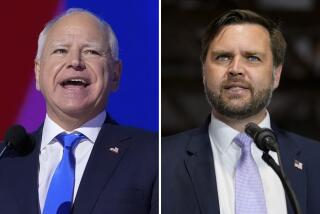More than plexiglass will divide Harris, Pence at the vice presidential debate
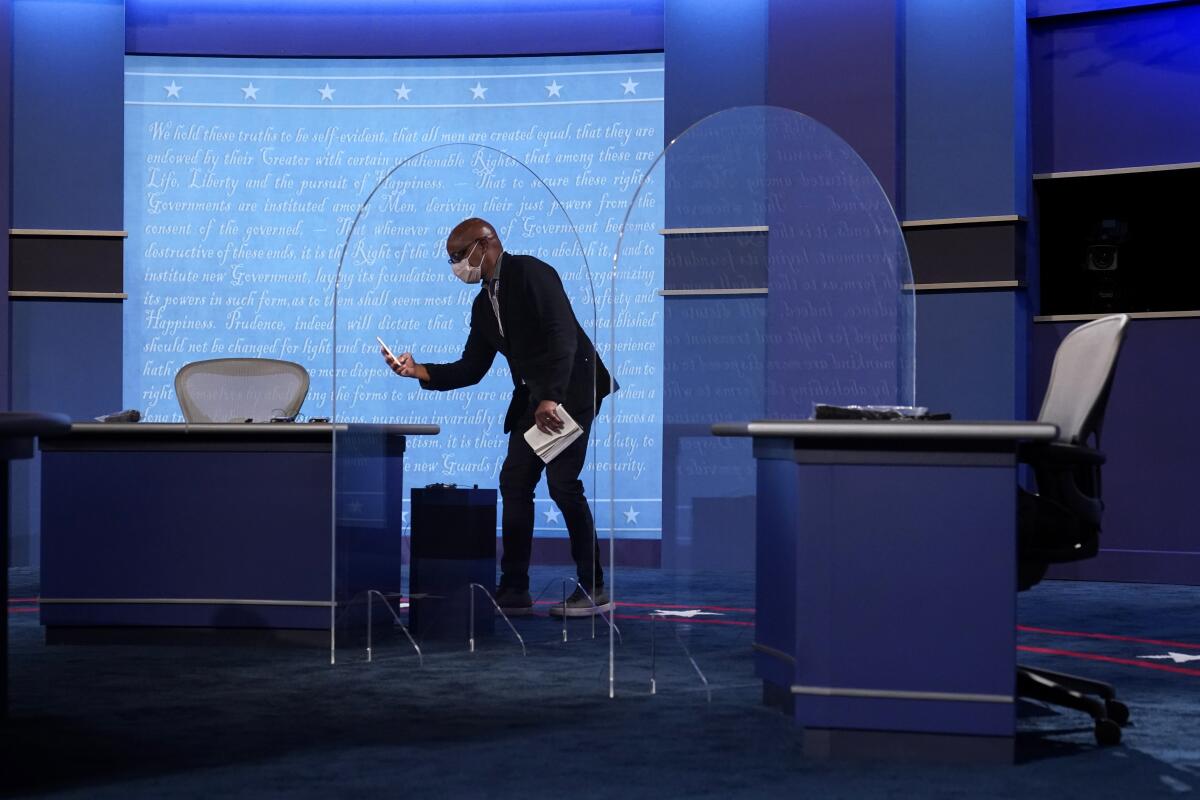
- Share via
After a last-minute fight over safety precautions, Vice President Mike Pence and California Sen. Kamala Harris will share a rare place at center stage Wednesday night — a socially distanced, plexiglassed debate stage designed to protect them from the pandemic that has inflicted President Trump and swept the White House.
The two will have a chance to argue up close, but not too close, the case each side has made from afar: Democrats assailing the administration’s handling of the deadly virus, Republicans portraying Harris as a radical leftist bent on seizing power from running mate Joe Biden.
It could make for lively viewing and may prove more informative than last’s week maelstrom, given the odds it will be a lower-key discussion than the presidential debate. But it’s likely to have little, if any, lasting impact on the race.
No vice presidential debate has ever mattered enough to decide a presidential contest, and Wednesday’s will probably be no exception.
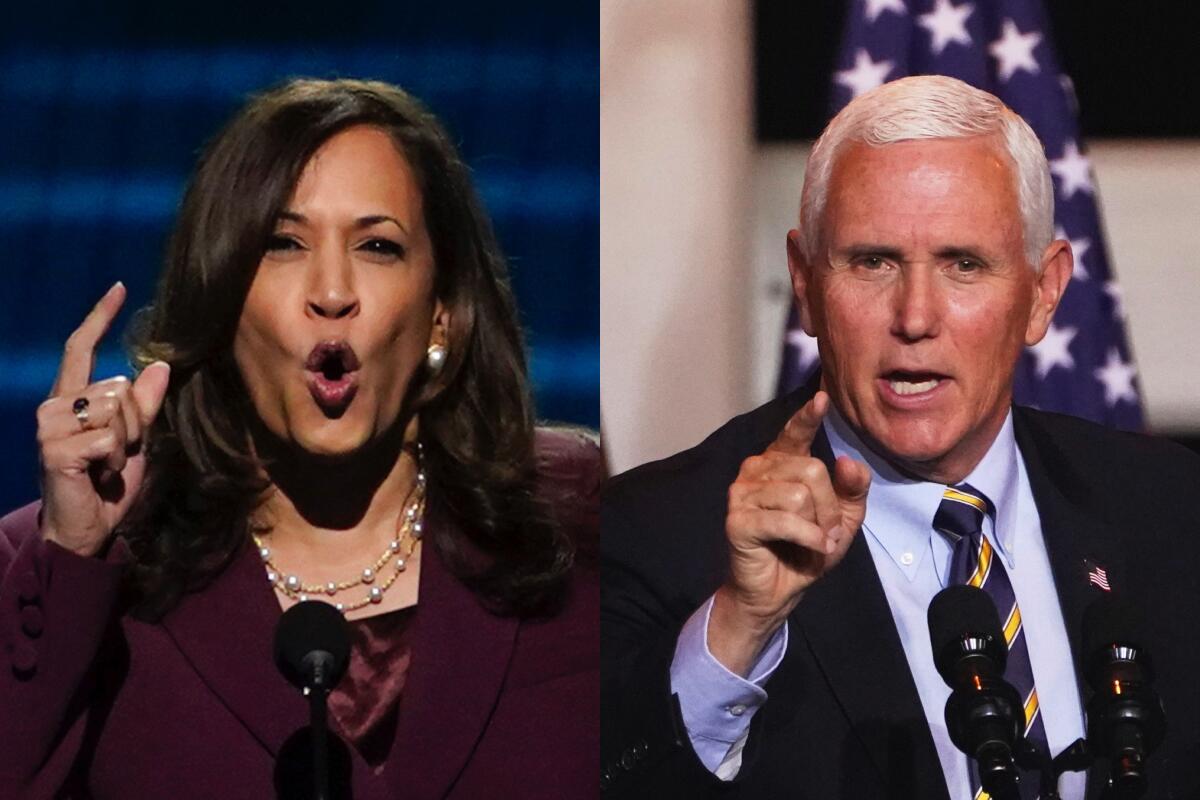
Still, the 90-minute session at the University of Utah in Salt Lake City could be more noteworthy than most because at age 77 and 74, Joe Biden and President Trump, respectively, are the two oldest major party presidential candidates in history.
“The actuarial tables have not been abolished,” said Michael Nelson, a Rhodes College presidential scholar who has written a book on the vice presidency. “There is a greater than normal chance we may be looking at a debate in which one of the candidates is the next president.”
Pence is 61, Harris, 55. Both candidates tested negative for COVID-19 as recently as Tuesday.
The debate comes amid rare movement in a presidential contest that, polls suggest, has been stagnant for months.
Surveys taken after the Sept. 29 debate, in which Trump repeatedly talked over Biden and hectored moderator Chris Wallace, showed the Democratic nominee widening his lead nationally and in several battleground states that will be key to deciding the election. Polls completed after Trump was hospitalized Friday with COVID-19 have not shown any movement back in his direction.
Given questions surrounding Trump’s health — he has returned to the White House and said he feels fine, but his underlying condition is unclear — the two remaining presidential debates are not certain to come off. That could leave Wednesday night’s session as the final political marquee event before the Nov. 3 election.
With concerns heightened after Trump’s post-debate diagnosis, added steps were taken to protect the health of Harris and Pence. The two will be seated 12 feet apart, as opposed to the originally planned seven. Members of the socially distanced audience must wear masks or risk expulsion.
Another precaution, the use of plexiglass barriers between Harris, Pence and the moderator, USA Today’s Susan Page, was thrown into question Tuesday when Pence balked at the arrangement. He subsequently agreed to comply if the barrier made the senator more comfortable.
There is no doubt COVID-19 and the health and economic ramifications of the pandemic will be a significant part of Wednesday night’s discussion.
Trump campaign operatives have claimed victory over the coronavirus for months. Now that the president has COVID-19, how do they reboot?
Since February, Pence has been charged with leading the White House Coronavirus Task Force. While some praise his work — “Mike did a superb job... to incorporate various viewpoints from different disciplines,” said Tomas J. Philipson, a former senior Trump administration economist — he will have to defend the president’s downplaying of a virus that has killed more than 210,000 Americans and cost millions their jobs.
“The government has not responded well,” said Joel Goldstein, a professor emeritus and expert on the vice presidency at St. Louis University School of Law. “Vice President Pence has some explaining to do.”
A former radio talk show host and a skilled debater, Pence will likely be more measured in his performance than the president, but no less aggressive in attacking Harris. By many accounts, he got the better of a seemingly overcaffeinated Virginia Sen. Tim Kaine, Hillary Clinton’s 2016 running mate, when the two squared off.
Still, Harris faces the higher expectations, owing to her breakout performance during the first Democrat primary debate and filleting of Trump officials in multiple Senate hearings. The anticipation obscures the fact that Harris has also had less-than-sterling debates, especially when aggressively challenged on her record.
Harris also stumbled over policy questions, a shortcoming that helped drive her from the Democratic presidential race, though she will have to do less parsing than she did navigating the tensions between her party’s factions.
Before his debate with Kamala Harris, Mike Pence rejects plans for plexiglass barriers added after President Trump and many other Republicans were diagnosed with the coronavirus.
“It’s a lot easier to draw a contrast between where [the Democrats] stand on issues versus where Donald Trump and Mike Pence stand,” said Brian Brokaw, who ran Harris’ two successful races for California attorney general.
The question of how aggressively to attack Trump has been made easier by his return to Twitter and political skirmishing. He has regularly invoked Harris’ name, painting her as a left-wing puppet master who will yank the more centrist Biden toward radicalism.
“If somebody’s in the hospital, you might be reluctant to be too critical of them,” Goldstein said. “But if he’s out operating in a way that seems ordinary, or close to ordinarily what he’s been doing, then I think there’ll be much less reluctance to criticize him.”
If history is a guide, attention will quickly turn away from Wednesday’s night debate.
The best either side can probably hope for, said Stuart Rothenberg, a longtime nonpartisan election handicapper, is a positive headline or viral sound bite. “At least,” he said, “that will give them something to talk about for two or three days.”
More to Read
Get the L.A. Times Politics newsletter
Deeply reported insights into legislation, politics and policy from Sacramento, Washington and beyond. In your inbox twice per week.
You may occasionally receive promotional content from the Los Angeles Times.
